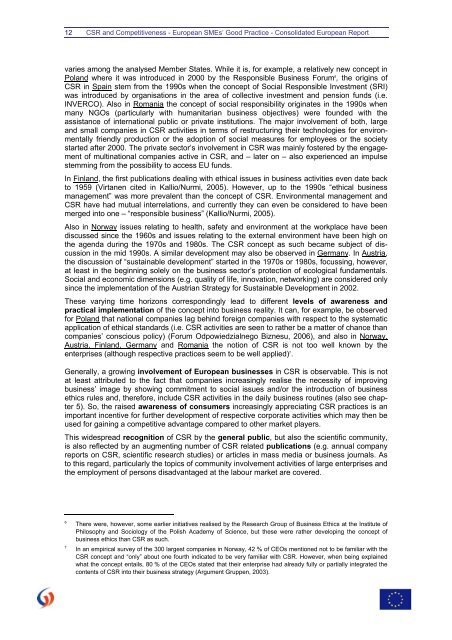CSR and Competitiveness European SMEs - KMU Forschung Austria
CSR and Competitiveness European SMEs - KMU Forschung Austria
CSR and Competitiveness European SMEs - KMU Forschung Austria
You also want an ePaper? Increase the reach of your titles
YUMPU automatically turns print PDFs into web optimized ePapers that Google loves.
12 <strong>CSR</strong> <strong>and</strong> <strong>Competitiveness</strong> - <strong>European</strong> <strong>SMEs</strong>’ Good Practice - Consolidated <strong>European</strong> Report<br />
varies among the analysed Member States. While it is, for example, a relatively new concept in<br />
Pol<strong>and</strong> where it was introduced in 2000 by the Responsible Business Forum6 , the origins of<br />
<strong>CSR</strong> in Spain stem from the 1990s when the concept of Social Responsible Investment (SRI)<br />
was introduced by organisations in the area of collective investment <strong>and</strong> pension funds (i.e.<br />
INVERCO). Also in Romania the concept of social responsibility originates in the 1990s when<br />
many NGOs (particularly with humanitarian business objectives) were founded with the<br />
assistance of international public or private institutions. The major involvement of both, large<br />
<strong>and</strong> small companies in <strong>CSR</strong> activities in terms of restructuring their technologies for environmentally<br />
friendly production or the adoption of social measures for employees or the society<br />
started after 2000. The private sector’s involvement in <strong>CSR</strong> was mainly fostered by the engagement<br />
of multinational companies active in <strong>CSR</strong>, <strong>and</strong> – later on – also experienced an impulse<br />
stemming from the possibility to access EU funds.<br />
In Finl<strong>and</strong>, the first publications dealing with ethical issues in business activities even date back<br />
to 1959 (Virtanen cited in Kallio/Nurmi, 2005). However, up to the 1990s “ethical business<br />
management” was more prevalent than the concept of <strong>CSR</strong>. Environmental management <strong>and</strong><br />
<strong>CSR</strong> have had mutual interrelations, <strong>and</strong> currently they can even be considered to have been<br />
merged into one – “responsible business” (Kallio/Nurmi, 2005).<br />
Also in Norway issues relating to health, safety <strong>and</strong> environment at the workplace have been<br />
discussed since the 1960s <strong>and</strong> issues relating to the external environment have been high on<br />
the agenda during the 1970s <strong>and</strong> 1980s. The <strong>CSR</strong> concept as such became subject of discussion<br />
in the mid 1990s. A similar development may also be observed in Germany. In <strong>Austria</strong>,<br />
the discussion of “sustainable development” started in the 1970s or 1980s, focussing, however,<br />
at least in the beginning solely on the business sector’s protection of ecological fundamentals.<br />
Social <strong>and</strong> economic dimensions (e.g. quality of life, innovation, networking) are considered only<br />
since the implementation of the <strong>Austria</strong>n Strategy for Sustainable Development in 2002.<br />
These varying time horizons correspondingly lead to different levels of awareness <strong>and</strong><br />
practical implementation of the concept into business reality. It can, for example, be observed<br />
for Pol<strong>and</strong> that national companies lag behind foreign companies with respect to the systematic<br />
application of ethical st<strong>and</strong>ards (i.e. <strong>CSR</strong> activities are seen to rather be a matter of chance than<br />
companies’ conscious policy) (Forum Odpowiedzialnego Biznesu, 2006), <strong>and</strong> also in Norway,<br />
<strong>Austria</strong>, Finl<strong>and</strong>, Germany <strong>and</strong> Romania the notion of <strong>CSR</strong> is not too well known by the<br />
enterprises (although respective practices seem to be well applied) 7 .<br />
Generally, a growing involvement of <strong>European</strong> businesses in <strong>CSR</strong> is observable. This is not<br />
at least attributed to the fact that companies increasingly realise the necessity of improving<br />
business’ image by showing commitment to social issues <strong>and</strong>/or the introduction of business<br />
ethics rules <strong>and</strong>, therefore, include <strong>CSR</strong> activities in the daily business routines (also see chapter<br />
5). So, the raised awareness of consumers increasingly appreciating <strong>CSR</strong> practices is an<br />
important incentive for further development of respective corporate activities which may then be<br />
used for gaining a competitive advantage compared to other market players.<br />
This widespread recognition of <strong>CSR</strong> by the general public, but also the scientific community,<br />
is also reflected by an augmenting number of <strong>CSR</strong> related publications (e.g. annual company<br />
reports on <strong>CSR</strong>, scientific research studies) or articles in mass media or business journals. As<br />
to this regard, particularly the topics of community involvement activities of large enterprises <strong>and</strong><br />
the employment of persons disadvantaged at the labour market are covered.<br />
6<br />
There were, however, some earlier initiatives realised by the Research Group of Business Ethics at the Institute of<br />
Philosophy <strong>and</strong> Sociology of the Polish Academy of Science, but these were rather developing the concept of<br />
business ethics than <strong>CSR</strong> as such.<br />
7<br />
In an empirical survey of the 300 largest companies in Norway, 42 % of CEOs mentioned not to be familiar with the<br />
<strong>CSR</strong> concept <strong>and</strong> “only” about one fourth indicated to be very familiar with <strong>CSR</strong>. However, when being explained<br />
what the concept entails, 80 % of the CEOs stated that their enterprise had already fully or partially integrated the<br />
contents of <strong>CSR</strong> into their business strategy (Argument Gruppen, 2003).




